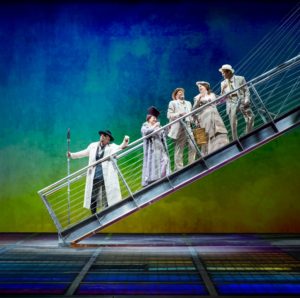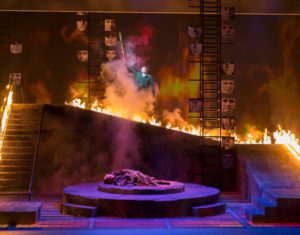[contextly_auto_sidebar]
I got chills at the end of The Rhinegold (as they called it at the Washington National Opera Ring, though they did the cycle in German).
And I cried at the end of The Valkyrie.
That’s one way to measure the power of this production, conceived and directed by Francesca Zambello, conducted by Phillipe Augin. Begun a decade ago, shelved for lack of funds, staged complete in San Francisco (with a different conductor), and now done complete in DC.
This is also a way to measure the power of the work itself. So why was I so deeply moved?
Well, the performances were mostly terrific, something I wouldn’t say lightly. Augin and the orchestra surpassed themselves, with a detailed, luminous, and loving performances. Sometimes with something like a chamber music approach, which won’t be to everyone’s taste, but also surging out with a big, even overwhelming sound when it had to.
And then the concept
This has been called an American Ring, with Valhalla an office tower, Wotan a corporate CEO, and Mime’s cave, in Siegfried, rendered as a broken-down trailer.
It’s also an environmental Ring, with, in Siegfried, trees cut down, and in The Twilight of the Gods the river Rhine despoiled, no water in it.
Updatings like these of course can feel silly, and often there are things in the text that don’t fit. Here one of those was Brünnhilde’s horse, mentioned a few times (and duly showing up in the supertitles), but nonexistent in the staging. The Valkyries were aviatrixes (so much fun typing that!), Amelia Earhart women, no flying horses (or horses of any kind) required.
Why it worked
But updated stagings can also make the meaning of a piece explode into our minds. So if you snicker at the thought of Mime living in a trailer, he’s just the kind of declassé failiure who might be found in one (not to say that everyone living in a trailer is a failure, of course).
And when Wotan shows up there, himself dispossesed, his power mostly gone, looking ragged, almost homeless, the setting underlines how lost he is. Which then gets doubled down in the second act, when he and Alberich encounter each other, both of them lost and hapless.
At moments like these, you don’t need any explanation of the work beyond what you see. Wotan, Mime, and Alberich, the ragged past; Siegfried the soaring future. (Which then makes the betraying in Twlight of the Gods all the more devastating, and the final fall of the gods inevitable.
A world without trees
The environmental theme of the production — one thing that’s hard to miss when you see a good Ring is the aging of the world, heard so clearly in the music, as the uncomplicated musical discourse in Rheingold gives way to something heavier, more complex and troubled, more laden with oncoming doom, in Götterdämmerung (to revert to the more familiar — at least to me — German titles).
The world is deeply hurt. Needs to be cleaned by fire and water, as we see happen at the end of the cycle, with a reasonable hope (even if this may not have been what Wagner had in mind) that now things can begin anew.
So in this production I saw that. Which means I felt it more deeply, and understood it more. What the Ring could mean, in our world now. (Which is one thing classical music badly needs, to be reborn in our contemporary world, with contemporary meaning.)
And going back to the American setting…
In Rhinegold we never see Valhalla, the extravagant new home of the gods, the building of which (and the fatal bargains made to pay for it) is the first step in their downfall.
What we see, instead, is something like a gangplank going up to the entrance, or maybe a lavish walkway. And, at the end of the opera, when the gods enter their new home, there they are, toasting each other with drinks as they enter, looking like idiot playboys. Except Wotan, portrayed as the only one who knows what it takes to keep their lush lifestyles going. And now in over his head.
It’s a brilliant conception. Again, something I understood in my gut the moment I saw it, with no need for theories or pondering. Whose power is ending? The ruling class, in our world the prosperous white men who’ve been running everything, but whose power seems now to be ending. (An irony here — these men, and their wives, would be among the opera company’s largest donors.)
One place this worked most powerfully — the start of the second act of Valkyrie.Set in the penthouse, if you like, of the Valhalla tower, Wotan’s CEO office, with windows looking out at the city far below.
We know who’d have such an office. Again no need for pondering. So then Fricka, Wotan’s wife comes in. Nailed as something of a bimbo, in Rheingold,when the gods are ensnared by the thought of grabbing the stolen gold, and Fricka asks — in a moment that read exactly right on stage — if the gold might be made into jewelry.
But now in Valkyrie she’s something else, a force for what now has become an obsolete notion of stability, but which the gods can’t get themselves beyond. (Just as people now can see the need for change — to combat global warming, let’s say — but don’t want their lives disrupted.)
Now she’s stronger than Wotan is, and again we feel that, because we know — on our terms, in our world — who these people are.
Wotan’s agony in the scene that follows — when he’s learned that the basis of his power is loveless, flawed, corrupt, and so the gods and he are doomed — is then also tangible.
And so these two scenes, the first two scenes in Act 2 of Die Walküre, (reverting again back to German), so famously boring even to convinced Wagnerians, were now unforgettable. Riveting. Because here the deepest meaning of the Ring emerged.
Which also happened because the singers so powerfully brought the drama and ideas alive, Alan Held as Wotan, Christine Goerke a last-minute substitute as Brünnhilde, Elizabeth Bishop as Fricka.
Feminism
And this is also a feminist Ring, directed by a woman. Which also gave it meaning in our time.
Two moments: When Siegfried goes off to be a hero in Twilight of the Gods, going almost at Brünnhilde’s command, but leaving her alone, she’s radiant with his heroism, lost in his masculinity — until he’s gone. Then she collapses in tears. An early sign that the macho values she unquestionably still takes from the (now doomed) culture she grew up in aren’t going to work.
(I should note that I haven’t yet seen Twilight of the Gods, because I came down with a fever. Went to Siegfried with it, then realized that was crazy, and when I still had it on the cycle’s final night, I made myself stay home. But my wife, as deeply caught up in all of it as I was, told me what happened. Here’s her radiant review.)
And, with special power…at the end of Valkyrie, as everyone wno loves these operas knows, Wotan puts Brünnhilde, his deeply-loved daughter, to sleep on a rock surrounded by a magic fire. (Real flames, in this production; breathtaking.) He’s been broken, as explained above. She’s been wildly disobedient, disobeying his command, doing the opposite of what he orders her to do, but in her disobedience in fact following his deepest will.
The magic sleep is a compromise. At first Wotan, in his fury, wants to leave her on the rock for whatever man first finds her. She brings him to a different place, and he protects her with the magic fire, so only a great hero can break through to her.
Such a moment, onstage, when we don’t know if he’ll agree to that or not. She takes his spear, in which his power lies, and, desperate, whirls in place with it, as if she could light the fire. Then falls on the rock, as if to say, “I’ve done all that I can. Now…”
When he caves (not just giving in to her, but finding his deepest will, even if it’s for his own destruction) she revives. And consoles him.
Which is just the opposite of what normally we see. Normally he, the strong (if broken) god, the man, the father, soothes his hurt daughter.
But not here. Here the broken man, his power ebbing, is consoled by the woman, whose life is now to be renewed. It seemed so right, so inevitable, one of those moments (and in the past generation these have been countless) where the deepest truths of men and women stand revealed, and we need to change the way we think.
All made stronger, in this peformance, by Alan Held, so meltingly lost and tender in the final scene. And by Augin and the orchestra.
One moment that stood out for me. The haunting, otherworldly chords of the transformation music, after Wotan kisses Brünnhilde’s godhood away. So soft, so radiant, so infused with magic, in the orchestra that night.
And I realized something that never struck me before, though I know the music almost by heart. When at first the winds play these chords, Brünnhilde still is a god. But when the strings come in, bringing the chords a little back to earth, she’s mortal. Of course I don’t know if Wagner thought or meant that, but it seemed to be a truth.
Why this matters
Apart from why great art always matters. But why this matters for my usual subject here, the future of classical music.
It matters, first, because performances like these show how powerful classical music can be. How, in a cycle of four operas, with the music and drama created by a great dramatist, Shakespeare’s equal (though of course he’s very different) classical music has a special kind of power that other music doesn’t have.
Which isn’t to say that other kinds of music don’t have special power of their own. But the power to take us on a journey lasting four nights, with every moment crucial to the evolution of the whole — that’s something classical music (because it’s planned in advance of a performance by a composer) is born to do.
But also in another post I’ll talk about the reaction of a newcomer to Wagner, how moved she was, how much she understood. So this is also about how we reach new people. With something so profound, so emotional, and so deeply truthful that our case is made for us.
Though there’s something else. Some things that didn’t work in the performances showed some limitations of opera, as it’s currently performed. Limitations that can make it weak, implausible, or even laughable to people we want to bring to our art. This is something we’ll have to fix!
Here, again, is my wife’s review of Twilight of the Gods, which can stand for a review of the entire cycle.




Terrific post! Sharing it on my Facebook page. Thank you, Greg!
Nice to hear from you! Thanks. As I said to Matt Westphal, that post was written with love.
Shouldn’t the plural be aviatrices?
😉
Lovely post, Greg.
Thanks! It was written with love.
SO wish I could have seen this production. I have really only recently become aware how much The Ring is a parable that speaks very much to social, environmental and very human issues that pertained to the Industrial Revolution and are still very much with us.